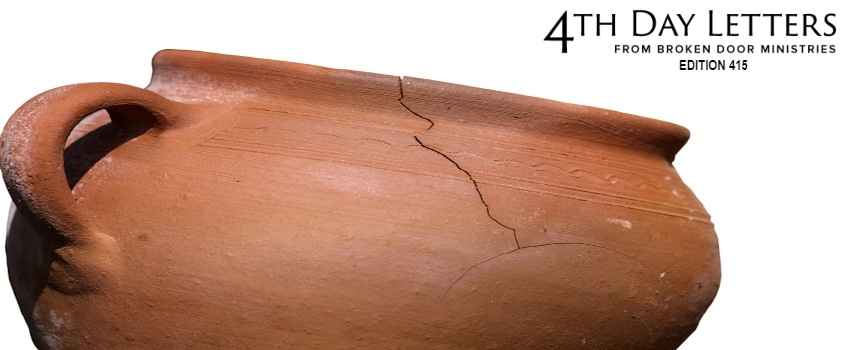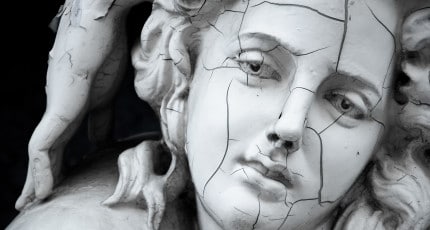
Without Wax
Podcast: Play in new window | Download
Subscribe: Apple Podcasts | RSS
Do a google search for the word sincere and you will find a debate regarding the origins of the word. One story, most likely arising from folk lore, states that sincere is derived from two Latin words: sine (without) and cera (wax). I am no expert in etymology, but I can state emphatically, that as Christian’s we should live a life without wax. Allow me to explain. Please read more.
As folklore goes, the word sincere came about as follows. During the Renaissance era, when sculptors made mistakes, they used wax or cera to hide the defects in their works. The buyers of their wares were unaware of the defects. However, when exposed to full sunlight, the wax melted, and the faults were exposed. Only those products free from defect, came to be known as sin-cera, or “without wax,” and eventually this became the origin for the English word, sincere.
 More scholars contend that this is just a good story. Merriam Webster defines sincere as follows:
More scholars contend that this is just a good story. Merriam Webster defines sincere as follows:
- free of dissimulation: HONEST
- free from adulteration: PURE
- marked by genuineness: TRUE
All Christians should seek to be described by others as someone who is honest, pure, and true. In other words, we should find no need to cover our faults with wax. We should be sincere.
Deceitful, dishonest, fraudulent, deceiving, and cunning convey the opposite meaning of sincere. These words are often used to describe Satan. Clearly no one wants to be described with such terms.
But let’s step back and ask ourselves a question. Do we hide our faults like the sculptors did in the story above?
2 Corinthians 4:7 tell us that we are earthen vessels. As fragile clay vessels, our sins cause us to chip and crack. In fact, no one among us is without fault. In 1 Timothy 1:15 Paul states, “Christ Jesus came into the world to save sinners. Of these I am the foremost.” If Paul, who was one of the greatest evangelists, could admit his sins, why can’t we?
 If we all have defects, why do we feel so compelled to hide them? Unfortunately, we do. Many of us wax over our faults like those deceptive merchants trying to sell flawed merchandise.
If we all have defects, why do we feel so compelled to hide them? Unfortunately, we do. Many of us wax over our faults like those deceptive merchants trying to sell flawed merchandise.
Because of what Jesus did for us, we no longer need to impress one another. God, who is the original potter, sent His Son to repair and transform us. “For our sake he made him to be sin who did not know sin, so that we might become the righteousness of God in him” (2 Corinthians 5:21). Through His death and resurrection, Jesus removed “our wax.”
Let’s take another look at the word sincere. If we desire to be honest, pure and true we should admit our sins, not to draw attention to them, but to draw attention to the One who removed our wax. We don’t boast of our brokenness, we boast of the one who repairs our brokenness.
Pride causes us to put forth a fake and deceptive exterior. Pride attempts to wax over our imperfections. Through pride, Satan caused Adam and Eve to fall. Now he wants to use pride to keep us chained to our sins. Acknowledging our sins allows us to point out the power, mercy and love of Jesus, who came to save us.
 For many years, I personally sought to wax over my sins and flaws. I looked better on the outside than I did on the inside. Now I want to spend my life allowing the warm, bright light of Jesus to melt away my imperfections. Philippians 2:3 tells us, “do nothing out of selfishness or out of vainglory.
For many years, I personally sought to wax over my sins and flaws. I looked better on the outside than I did on the inside. Now I want to spend my life allowing the warm, bright light of Jesus to melt away my imperfections. Philippians 2:3 tells us, “do nothing out of selfishness or out of vainglory.
With the wax removed, we can live an authentic life. We can stand sincerely before God as flawed, yet redeemed children. Jesus says this in Luke 8:17. “For there is nothing hidden that will not become visible, and nothing secret that will not be known and come to light.”
Let’s make today, the day that we humble ourselves, squash our pride and seek to live as sincere, without wax, Christians. In doing so, we will bring honor and glory to the one who saved us.
Heavenly Father, I come before you humbled by my flaws. I stand here eternally grateful for the gift of salvation offered to me through your Son’s death on the cross. Grant me the courage to live a life without wax. Amen
 As always, I love to read your comments below as well as hear from you personally by clicking here.
As always, I love to read your comments below as well as hear from you personally by clicking here.
Don’t forget to mark your calendars
On December 6-8, 2019, I will be leading a 3 day Advent Retreat. Catholics as well as non-Catholics are welcome to attend. Fr. Ed Sheridan will join us to celebrate Catholic mass and Reconciliation will be available. Author Joseph Galloway will be giving a talk about his book The Broken Door and will be signing books. The retreat is being held at the Catholic Conference Center in Hickory, NC. It’s beautiful! I hope you can join us. Click this link to sign up.
- What Is The Church’s Role In Society? - July 21, 2024
- The Thorn Remained - July 14, 2024
- The Confounding Nature Of Freedom - July 7, 2024

Just awesome!!
Alex
Thanks!
Brian
Brian: Another great letter that could be used in your retreats.
Jim
Thank You!
Brian, it seems to me that what you write about today is an essential component of the sacrament of Reconciliation. Reconciliation asks us to own up to our shortcomings, to recognize where we have failed, and, most importantly, gives us an opportunity to make the commitment to do better. How blessed we are to have a God who became human and so recognizes our frailty and our tendency to hide weaknesses from others. Hearing those words of forgiveness spoken aloud is so powerful. I love the way St. Therese of Lisieux wrote about our shortcomings and God’s forgiveness. She likened us to a small child who first tries to deny wrongdoing but then confesses with tears in his eyes. She likens God to a mother who seeing her child’s tears immediately forgives her child and listens to his promises to be better even though she knows that the child will fail to be good again. As always, thanks for your ministry.
Jim
Great post! Allow me to add one thought. It is clearly important for all Christians to confess their sins, and for Catholics of course, this means doing so in Reconciliation. But I want to make a key point here. In my retreats I point out that it is easier to confess your sins to the priest, who is sworn to secrecy, than it is to tell anyone else. Because the priests is bound to secrecy, our sin, in a way, is still hidden in the dark. It is known by only us and the one who can’t tell anyone. Most people struggle with recurring sin, even after confessing it in Reconciliation. I personally believe that something very important happens when, in additional to confessing in Reconciliation, we tell a friend, or family member about our struggle. This brings our brokenness it into the light of day. I believe this is vital to regaining power over the sin. When we are vulnerable and “sincere” with others we are really stripping the wax off. It can be painful, but admitting your struggle is an essential first step in almost every recovery program.